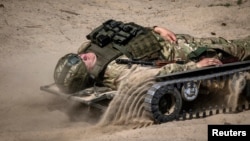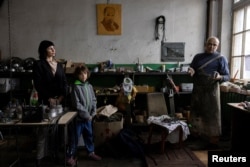Ukrainian teenager Yelisei Mamonov dreams of attending his country's top technical university one day.
For now, he is gaining valuable experience at a family-run workshop making remote-controlled stretchers. They are used to rescue wounded troops as Russia's invasion continues.
Yelisei, who is 14, works under his father Dmytro, a former factory manager. He also works alongside his 10-year-old sister, Yesenia.
Yelisei has already put dozens of devices into use.
"We need to scale it up. We want as many as possible to be at the front, so that every unit, every company has one," Yelisei said. As he spoke, a model sped down a dirt track at a training ground outside the capital Kyiv.
The Mamonovs fled the eastern city of Sloviansk shortly after Russia invaded Ukraine in February 2022. They set up production in central Ukraine, far from the bombs that once landed on their street.
Reporters with the Reuters news agency recently visited their workshop. The Mamonovs showed off two models. One was a lightweight, foldable stretcher. The other was a larger tracked vehicle, called a TerMIT (Tracked Modular Infantry Transporter).
Yesenia has learned how to connect electrical parts. She changed the wheels on the smaller model, which costs about $1,900 to make. The TerMIT's production cost is about $5,200.
The business, called Tank Bureau, is doing great, said wife and mother Oksana. She is also involved in the project. She takes orders for front-line troops.
She ignores criticism from family members and others that her children are missing out on a normal childhood.
"I think that, on the contrary, when they grow up they'll be thankful because they'll have more skills than others," Oksana said.
Drones and other high-tech devices are playing an increasingly important part in the war. Top Ukrainian officials have said there is a need to increase domestic production.
The Mamonovs' business has been funded by a Ukrainian government effort to increase defense technology production. But more support may be needed to reach Dmytro's vision: a battlefield where robotics are as widespread as first-aid kits.
"That means mass production, that means we need a proper plan," he said. "But in order to reach this, we need a radical leap forward."
I’m Dan Novak.
Dan Novak adapted this story for VOA Learning English based on reporting by Reuters.
______________________________________________
Words in This Story
stretcher — n. a device that is made of a long piece of thick cloth stretched between two poles and that is used for carrying an injured or dead person
scale up — v. to increase the size, amount, or extent of
track — n. a pair of metal bars that a train, trolley, or subway car rides along
on the contrary — n. used to state that the opposite of what was said before is true
drone — n. a deep continuous sound
radical — adj. very new and different from what is traditional or ordinary







Forum